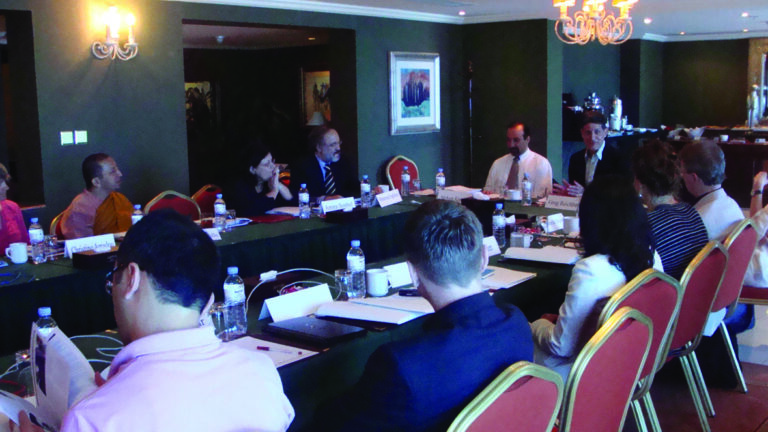Dialogue Series, Race & Society, Regional Studies
Comparative Ethics of War

on May 3–4, 2009, the “Comparative Ethics of War” working group meeting was co-sponsored by the Center for International and Regional Studies (CIRS) and the International Peace Research Institute, Oslo (PRIO). The meeting, which took place in Doha, is part of a larger research initiative undertaken by PRIO. The research group met twice previously, in Stresa, Italy in August 2007 and in Oslo, Norway in August 2008. The project is funded by a grant from the Research Council of Norway.
The working group was made up of eleven scholars who debated the “Comparative Ethics of War” from unique religious, theoretical, and ethical perspectives. Each scholar represented a different theoretical and religious tradition and discussed the question of ethics during times of war from Islamic, Christian, Sikh, and Buddhist perspectives as well as from feminist, post-modernist, historical, and socialist standpoints.
During the working group meeting, the participants debated the genesis of the question of ethics and just war, and examined their intersections with religious texts and the surrounding social infrastructure during particular historical moments. The ethical impetus of many social structures, they argued, is drawn from religious teachings and behavioral norms promoted by scripture. The political undercurrents regarding the question of human rights, social justice, bettering the means of living, and promoting particular social contracts were also analyzed and compared within each religious tradition. The working group members agreed that to understand the ethics of war, the underlying social structure at particular historical periods must also be examined, thus paying homage to the inextricable links between religion and social models.
There is a strong element in each religious tradition that condones the fight for social justice, and implicitly supports warfare for what is believed to be defending justice and for change. It is supported through the primary sources of many religions that there have been religiously-backed movements for ‘change.’ Historians usually focus on the major changes that have occurred within each religious context but not on the smaller movements. Most collections of scripture have been studied by theologians whose interest has been to study law and practice, but seldom have the sources been scrutinized for their social and historical implications.
The “Comparative Ethics of War” research initiative will result in an edited volume to be published by Cambridge University Press. The book will assemble the most representative primary sources and editorial commentary from the world’s leading religious traditions, on norms of war. Within the context of the book, the working group aimed to clarify the meaning of terms such as Jihad in order to point out their current use by the media and within the popular vernacular. The scholars recommended carrying out a close scrutiny of the verses which mention a particular religious term and how the usage of language in the text may have a different meaning. The working group members also discussed the actual intellectual process of the project and their handling of issues such as the difficulty of obtaining relevant sources and gaining access to materials. In addition to this edited volume, the project participants are also writing scholarly articles and monographs on selected topics in comparative ethics of war. Some of these publications were presented at the workshop.
CIRS will publish a Summary Report of the meeting, which will include paper synopses and biographies of the working group members. The working group was made up of:
- Christine Amadou, University of Oslo
- Torkel Brekke, University of Oslo
- Mahinda Deegalle, Bath Spa University
- Mohammad Faghfoory, George Washington University
- Ivan Koniar, Catholic University in Ruzomberok, Slovakia, and Visiting Scholar,International Peace Research Institute, Oslo
- Greg Reichberg, International Peace Research Institute, Oslo
- Kaushik Roy, Presidency College, Kolkata
- Hanne Røislien, Norwegian University of Science and Technology, and International Peace Research Institute, Oslo
- Amira Sonbol, Georgetown University School of Foreign Service in Qatar
- Yuri Stoyanov, University of London
- Henrik Syse, International Peace Research Institute, Oslo
Article by Suzi Mirgani, CIRS Publications Coordinator